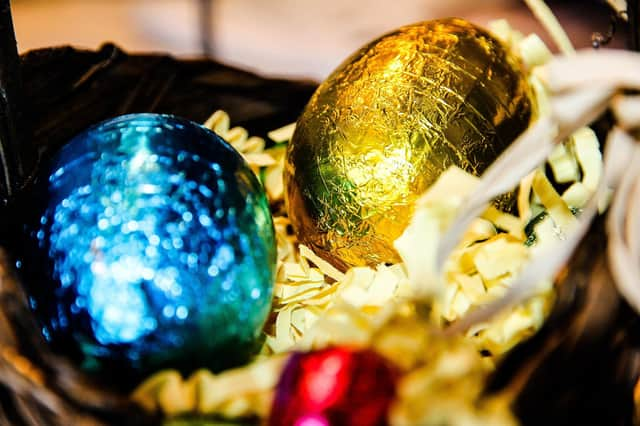Why we need to make wise choices when buying our Easter eggs


Chocolate is such an easy gift to buy and give, as most people enjoy a chocolatey treat.
But have we given enough thought to the production of our Easter eggs and chocolates as well as the cost to animals, the environment and the farmers growing the raw product?
Advertisement
Hide AdAdvertisement
Hide AdSo now we all know that cows are repeatedly impregnated, have their babies taken away shortly after birth (with the well-documented separation issues this causes both mother and baby) and that the cows are not able to live out anywhere near their normal lifespan – is it time to think again about the dairy chocolate in our shops?
Let’s look at the amount of plastic and cardboard produced when Easter and the impact on our environment - uswitch.com say that it takes 10,000kg of water to produce 1kg of dairy chocolate and last year they estimated it took 288,044,640,00 litres of water to make the dairy Easter eggs sold.
Waste Connect UK estimated that 8000 tonnes of waste were produced from Easter egg packaging. Some of this, could of course, have been recycled – but why are we using our planet’s limited resources to produce something so transitory?
Advertisement
Hide AdAdvertisement
Hide AdOnly a small number of dairy chocolate eggs produced come from Fairtrade farmers, which means cocoa farmers are not even getting a fair price for their crops, and the production is not sustainable.
‘Food is Power’ and ‘End Slavery’ now campaign to end child labour in the cocoa industry – children work up to 14 hours a day often using dangerous equipment like chainsaws to clear land for crops. This is all so we can enjoy a short lived treat.
So how can we still treat ourselves and others without causing damage to animals, the environment and humans?
Firstly, we can ditch the dairy. There is an absolute plethora of dairy-free eggs on the market now – my group found tasty eggs or Easter treats in Aldi, Morrison’s, ASDA, Marks and Spencer, Co-Op among others.
Advertisement
Hide AdAdvertisement
Hide AdMost of these are made with oat ‘milk’ which is a much more sustainable product than dairy milk.
According to the BBC’s carbon footprint calculator, one glass per day of dairy milk (or close to one chocolate bar a day) produces 229kg of greenhouse gases (which is equivalent to driving a petrol car 585 miles or heating your home for 36 days).
Oat milk (or an oat milk chocolate bar) produces 65kg greenhouse gases (equivalent to 168 miles in your car or heating your home for 10 days) – it is easy to see how bad chocolate is for our environment.
So what are the alternatives? Try one of the dairy-free chocolate eggs or bars, look for those with minimal packaging, or consider a gift of local flowers or a plant instead.